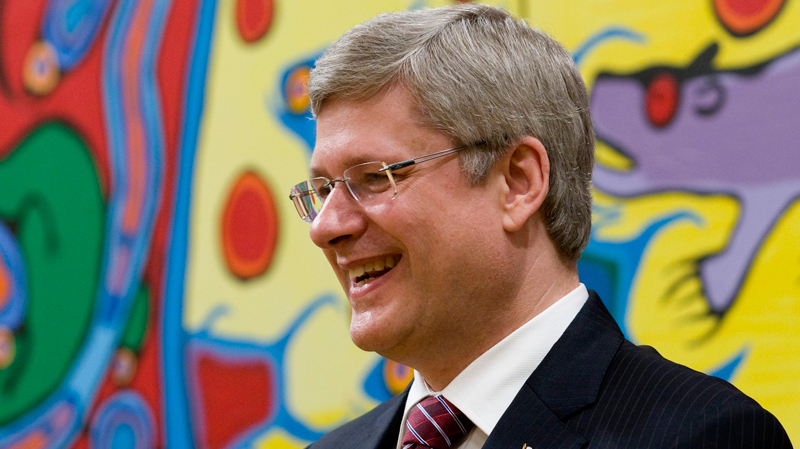
Conservatives will reap the benefits

It will be forgotten, just as all of his controversies within 2 years were forgotten on May 2 – there was a long list of them too… The future is bright for Stephen Harper. He even has an official opposition leader that will be no challenge in the next election… Canadians believe him when he says that the $70 billion in new spending that the NDP want to implement doesn’t grow on trees – that is no secret. In the Conservative camp, la vie est belle.
No one should be surprised at any of the outcomes that are arising, or any of the outcomes that have yet to come. We have seen Stephen in minority and he hasn’t changed for his majority – why would he? He has a majority now…
So we now have a government who was elected on the promise of slaying the deficit while stating once elected that it won’t be in the upcoming budget. Added onto that, the Conservative vision for smaller government was smashed when it appointed one of the largest cabinets in history, aligning with Brian Mulroney and Paul Martin.
And on top of that, these new Conservative MPs will be getting nice salaries and perks off the taxpayer’s backs – which is standard, but this time, we are paying $9 million for them… the largest bill the Canadian taxpayer has ever had to pay for a government’s salary – especially in a time when family budgets are tight. Was that a slap in our face or what? We the tax payers are going to be taken for a ride, and quite frankly, it wouldn’t make any difference if it was the Conservatives, Liberals or NDP who were in charge at the moment.
What is disappointing is that Stephen took Canadians for idiots and it worked. What is disappointing is that he promised to slash $4 billion from bureaucracy and lined his pals with $9 million… now is the time to be scaling back, but it is clear that the Conservatives need a larger cut to suit their reward.
The 2011 figures state that each of our elected officials will be raking in $157,731 annually – the 19 year old NDP representative from Sherbrooke, Quebec must be happy. Instead of working at a golf course, he will have made $630,924 in 4 years, a lot more than enough to cover university, if he still bothers to go.
Harper, meanwhile, will get double that and a car allowance. His $317,574 taxpayer-funded salary is modest in comparison to the bank presidents and the top executives in the private sector that he promised to support with further cuts to their taxes.
The Ministers will each be making $233,247 annually plus a car allowance while Ministers of state make $214,368 without a car allowance.
Marjory LeBreton is the leader of the senate, and she will be making $207,800. Meanwhile, her fellow senators will each be making $132,300 per year.
When you sum a PM with 25 ministers, 11 ministers of state, the senate and senate leaders, and include the perks, the sum will come close to $9 million – this doesn’t include the staffers.
Meanwhile, the Conservatives quietly approved increases in the maximum salaries that political staff are entitled to receive. On April 1, these changes took effect, all the while Harper promised to balance the budget by 2014-15 with cuts, obviously these cuts won’t effect his people, they will effect us. Harper said at the time, that this would be achieved “by controlling spending and cutting waste.” It is now clear that things that help people are waste and things that help his party are great, Conservative supporters can be so proud!
Harper defended his choice by saying,
“I think it’s important to know when you’re talking about austerity, that this government has reduced ministerial budgets significantly,” he said after his cabinet was sworn in at Rideau Hall.
“So the question here is not cost. The question is making sure that we have a ministry that is broad, representative of the country and tries to use people’s talents to the maximum. …
“I think it would be a mistake to try and have a smaller cabinet that would make less use of people.”
When Mulroney appointed his first Progressive Conservative cabinet in 1984, a minister earned $95,200 and they each had a $17,600 tax-free expense allowance. Mulroney made $115,100 plus tax-free expense allowance.
Martin’s first cabinet came in late 2003. A minister’s salary with car allowance was $208,522 and junior secretary of state job earned $189,312. Martin made $280,522 at the time.
The Canadian Taxpayers Federation said that for every dollar that a cabinet minister makes, taxpayers will pay four dollars at the same time.
Statistics Canada, meanwhile, states that the median after-tax income that a typical Canadian family of two makes is $63,900.
In four years, Canadians will likely forget all of this. Perhaps they were willing to accept Harper’s plea that the opposition was in fault for his flip flops and out of the kindness of their hearts gave him a chance. Or, perhaps, Layton’s plan was detrimental for the country and the Liberals were obviously out of the game. Or, perhaps, as Stephen Harper once wrote, the electorate is “uninformed and apathetic.” It goes to show that regardless the reason, Canadians were obviously played for fools and now they shall pay the price.
Canadians will pay $9 million per year for extra treats and goodies for their Conservative government that only represents 39.6% of its population’s values and completely goes against what it stands for. Stephen, as a word of advice – it may be late now… don’t ever promise that you are going to reduce the size of government, we all know that once you get in, the power consumes you. But don’t worry, Canadians will likely give you your second majority mandate in four years. La vie est belle Premiere Ministre, La vie est belle!
To all of us Canadians that are forced to live with the fact, is it not ironic that Conservatives say that it is wrong for tax payers to shell out money to fund healthcare and social programs and that it is wrong that tax-payers pay for those who “don’t want to work and abuse the system” but when it comes to dealing with taxpayer’s funds, they make it clear that it is fine for Canadians to pay their higher salaries and bureaucratic costs?




